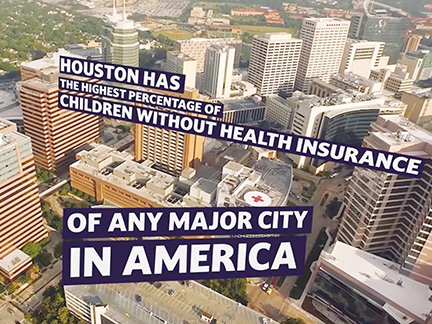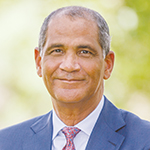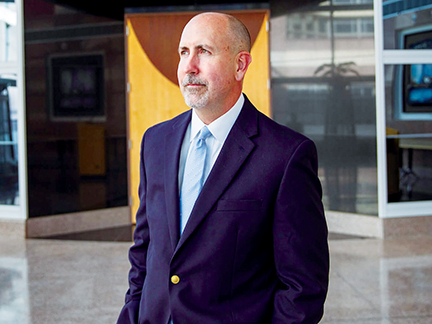A video series being produced by St. Luke's Health is spotlighting the paradox faced by people who live near the Texas Medical Center in Houston but are unable to access most of its world-class services because they are uninsured or underinsured.
St. Luke's Health, based in Houston, is part of CommonSpirit Health. St. Luke's and the Baylor College of Medicine are joint owners of Baylor St. Luke's Medical Center, an academic and research hospital that is part of the 1,345-acre Texas Medical Center complex. The complex calls itself "the largest medical city in the world."

The complex is a partnership of several member institutions, including hospitals, health systems, public health agencies, colleges and hospices. Facilities on the campus tally more than 9,200 beds, 10 million patient visits, and 180,000 surgeries per year.
Despite the complex's vast health care offerings, Doug Lawson, chief executive of St. Luke's Health and senior vice president of operations for the Texas Division of CommonSpirit Health, says many residents of Houston and surrounding communities can only access its care in its emergency departments because they lack health insurance for primary and specialty care.
"That is the most expensive and inefficient and, ultimately, ineffective way to project care," Lawson says.
First, the challenge
To shine a light on the situation, St. Luke's is tapping the insight of health care executives and providers and civic leaders for its eight-part video series called "ExamiNATION."
The first episode, "The Challenge," came out in September. The five-minute video focuses on social justice issues within Houston's health care system. One of the initial statements made is that the city has the highest percentage of uninsured children of any major American city. The speaker, Stephen L. Klineberg, the director of the Kinder Institute for Urban Research at Rice University in Houston, says that fact is central to the challenge of "building a viable society in the 21st century."
Another featured speaker in the episode is Houston Mayor Sylvester Turner. He notes that in some of the city's ZIP codes life expectancies are as much as 25 years less than in others.
"Recognizing where these health disparities are, that's important," Turner says in the video. "But then, once you recognize them, the question is: What type of investment, what type of resources are going to be put into these communities not just to touch on them but to be transformational in terms of people's health care to remove the unjust disparities, the inequities, and bring these communities up?"
Flattening the curve
The second episode, "Managing Chronic Conditions & Cancer," came out in October. It underscores the importance of regular screenings and maintenance exams to detect disease early and how lifestyle
decisions and environmental factors affect health.

One of the speakers in the eight-minute episode is Dr. Kenneth Wells, a physician who is president of Alken Health Resources, a firm that designs, implements and manages corporate health care and wellness services. Wells is a past member of the board of directors of St. Luke's and of Irving, Texas-based CHRISTUS Health.
He notes in the video that early detection is a key to thwarting the progression of cancer and other diseases. "You may not stop the disease from occurring in totality, but you can certainly flatten the curve as it relates to it and ideally prevent it from extending on and requiring more invasive-type therapy," he says.
In an interview with Catholic Health World Wells adds that the inability of some people to get screenings and checkups puts them at greater risk of getting diagnosed later in the disease process and having a bad medical outcome. "We like to think that care is delivered consistently and uniformly," Wells says. "The reality is, it is not."
He's hopeful that the video series will open the eyes of the leaders across the city and state to the need for access to and funding for medical care for all residents.
"I'm old enough to know better than to think that it's going to revolutionize things," Wells says of the video series. "But I think maybe it will move the ball farther down the road in terms of allowing people to think about these things, perhaps differently, and to realize we're all in this together."

Released in December, the third episode in the series focuses on the need for access to mental health care. One of the speakers is Cardinal Daniel DiNardo of the Archdiocese of Galveston-Houston. "One of the things the church can do is to encourage our own people and people everywhere to not see mental distress or mental health distress as something that is shameful," Cardinal DiNardo says.
He adds that mental, psychological and spiritual health "is important if we're going to make sure that our bodily health is sound."
Other topics that the series will explore in future episodes include heart health, human trafficking, health care affordability, and diversifying the caregiver workforce.
Starting the conversation
One of the roadblocks to access that the speakers in the videos mention is Texas' refusal to expand Medicaid under the Affordable Care Act, as most states have done. A study by Texas A&M University estimates that if the state were to expand Medicaid under the ACA, 1.5 million more Texans would be eligible to enroll. The U.S. Census Bureau says Texas, at 18%, has the highest percentage of uninsured people in the nation.
Lawson says St. Luke's has been among the voices in the health care sector strongly urging the state legislature to expand the public insurance program under the ACA, so far to no avail. "People are suffering as a result of our lack of expansion," he says. "It's very disappointing and frustrating for all of us that are in health care in Texas."
St. Luke's is using its social media channels to get the "ExamiNATION" videos seen. Lawson says he knows the videos are getting views based on the number of shares, likes and comments on the posts and on the feedback he gets, which he says is overwhelmingly positive. The first episode in the series had more than 2,600 views on YouTube by early January.
Lawson says St. Luke's is using the series as a sort of pilot to see how best to get its messages out. He hopes that the videos are sparking discussions at dining room tables, in corporate board rooms and among policymakers about the need for wider access to health care.
"Ultimately, more than anything, I'm hopeful that we create a positive and productive conversation that puts us in a position to improve health and wellness across the communities that we serve," he says.
